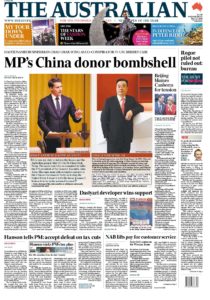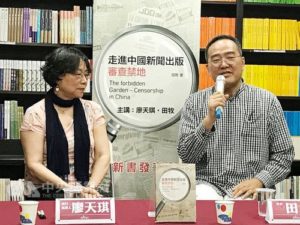 A classified government report has uncovered attempts by the Chinese Communist Party (CCP) to influence all levels of politics in Australia. The report was commissioned by Australian Prime Minister Malcolm Turnbull in 2016, and used the resources of both the prime minister’s office and the Australian Security Intelligence Organization (ASIO), say news reports:
A classified government report has uncovered attempts by the Chinese Communist Party (CCP) to influence all levels of politics in Australia. The report was commissioned by Australian Prime Minister Malcolm Turnbull in 2016, and used the resources of both the prime minister’s office and the Australian Security Intelligence Organization (ASIO), say news reports:
According to the Australian news outlet 9News, and later confirmed by Fairfax Media, the yearlong inquiry found the CCP has tried to influence policy and gain access to all levels of government for a decade. The report also described China as the most concerning country to Australia.
“Unlike Russia, which seems to be as much for a good time rather than a long time, the Chinese are strategic, patient, and they set down foundations of organizations and very consistent narratives over a long period of time,” said former China news correspondent John Garnaut.
 “They put an enormous amount of effort into making sure we don’t talk about what it’s doing,” he told the US House Armed Services Committee, adding that countries have “failed to recognize a lot of the activity that has been going on.”
“They put an enormous amount of effort into making sure we don’t talk about what it’s doing,” he told the US House Armed Services Committee, adding that countries have “failed to recognize a lot of the activity that has been going on.”
Former Labor foreign minister Bob Carr — who heads a China think-tank part founded by Huang Xiangmo, a Sydney billionaire with close ties to the CCP and who has given large donations to the major parties — recently urged Labor Senator Kristina Keneally to ask questions of public servants in parliament about Mr Garnaut’s work. Mr Carr denied drafting the questions, the Sydney Morning Herald adds.
Labor MP Michael Danby hit out at the former minister, saying his “false-flag intervention gives chutzpah a new meaning.
“Bob Carr is a pro-Beijing extremist paid by the pro-Beijing think tank, Australia China Relations Institute (ACRI),” he said. “ACRI was largely funded by the Huang Xiangmo. ACRI is now financed by Australian and Chinese businesses arm-twisted into backing the Beijing line by financing Carr’s discredited outfit.”
 Danby (left) – who has been strongly critical of Mr Carr on foreign policy issues – congratulated Andrew Hastie, who chairs the powerful intelligence and security committee, on his recent exposure of CCP influence.
Danby (left) – who has been strongly critical of Mr Carr on foreign policy issues – congratulated Andrew Hastie, who chairs the powerful intelligence and security committee, on his recent exposure of CCP influence.
China’s Communist Party has so much power in New Zealand that western countries might stop sharing intelligence, analyst Peter Mattis testified to the US-China Economic and Security Review Commission last month.
The government has been trying to sell China as a brand—one that has the ability to attract people from other countries in the way that America did, the Economist notes:
A decade ago the Communist Party declared a new goal: to build “soft power”, as a complement to its rapidly growing economic and military strength. It spends some $10bn a year on the project, according to David Shambaugh of George Washington University—one of the most extravagant programmes of state-sponsored image-building the world has ever seen. Mr Shambaugh reckons that America spent less than $670m on its “public diplomacy” in 2014.
 Taiwan is the last fortress of democracy and free speech of the Chinese-speaking world, exiled Chinese writer Pan Yongzhong (left) said at a book launch in Taipei on Saturday:
Taiwan is the last fortress of democracy and free speech of the Chinese-speaking world, exiled Chinese writer Pan Yongzhong (left) said at a book launch in Taipei on Saturday:
Pan, better known by the pseudonym Tian Mu, said the Chinese Communist Party (CCP) has essentially cut off all Chinese-speaking channels to the outside world so that there can be no understanding of the Taiwan government or its voice of justice and conscience. [What a National Endowment for Democracy report describes as Beijing’s ’sharp power’] is pervasive Tian Mu said at the launch of his new book “The Forbidden Garden — Censorship in China.”
 However, he said, not all of the 40 million overseas Chinese support Beijing’s policies, and many of them care a lot about the future of Taiwan. In particular, dissidents in exile “hope that Taiwan will stand firm” against the pressure, Tian Mu said. The existence of Taiwan’s political system, model and values puts pressure on the CCP’s despotism.
However, he said, not all of the 40 million overseas Chinese support Beijing’s policies, and many of them care a lot about the future of Taiwan. In particular, dissidents in exile “hope that Taiwan will stand firm” against the pressure, Tian Mu said. The existence of Taiwan’s political system, model and values puts pressure on the CCP’s despotism.
Tienchi Martin, director of the Independent Chinese PEN Center (ICPC), suggested that Taiwan use its soft power to break through Beijing’s lockdown.
When Harvard’s Joseph Nye wrote about soft power, he argued that much of America’s had sprung from its civil society: “everything from universities and foundations to Hollywood and pop culture.” But China’s ruling communist party “is distrustful of civil society; its soft-power building has been almost entirely state-led, the Economist adds:
China has tried to combine elements of soft power with the hard power of its illiberal politics. Far from enhancing China’s global image, this approach has often served to undermine it. Some people in China privately grumble that the party itself, with its intolerance of dissent, is the biggest obstacle to the country’s soft-power development. Since taking office, Mr Xi’s relentless efforts to clamp down on civil society have hardly helped. RTWT







